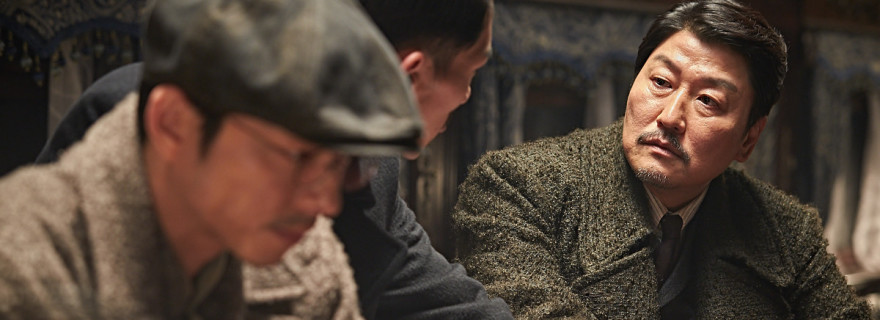'The Age of Shadows'
Movie Rating:
4
Korean master Kim Jee-woon has dipped his toe in many a genre pool over the years and always tends to deliver something uniquely entertaining. He made a slow-burn horror yarn in ‘A Tale of Two Sisters’, a wacky Spaghetti Western homage in ‘The Good, The Bad and the Weird’ and the brilliantly nasty serial killer flick ‘I Saw the Devil. Rather than lick his wounds after his American debut ‘The Last Stand’ bombed at the box office, Kim has delivered possibly his most ambitious production to date in ‘The Age of Shadows’.
Set during the Japanese occupation of Korea, the film is a twisted tale of double-crossing and double agents that drips with intrigue. Song Kang-ho (‘The Host’, ‘Sympathy for Mr. Vengeance’) stars as a weary Korean working for the Japanese police force, specifically assigned to root out a secret resistance army working in the shadows. Kim’s regular muse Lee Byung-hun gets a smaller role than usual as a mysterious folk hero of the movement, who Song admires while working for the other side. Things get complicated when Song is assigned to take down the resistance leader (Gong Yoo) and instead decides to become a double agent feeding phony baloney info to the Japanese to help win the good fight for his oppressed countrymen. He’s also partnered up with a temperamental officer (Um Tae-goo) who is passionately aligned with the Japanese occupying force, so things get tricky rather quickly.
Think of ‘The Age of Shadows’ as a John le Carré spy novel hopped up on amphetamines. It’s a tale of tricky alliances, big secrets and dread. However, Kim shoots it like a blockbuster action movie with bursts of adrenaline. Barely a scene passes without some level of tension or an explosion of excitement. Kim’s ever roaming cameras keeps nerves jittery. Viewers will expect someone to burst out of the corner of practically every frame and anticipate that every scene will quickly go horribly wrong.
The period design is lush and gorgeous, easily matching any Hollywood production. The set-pieces are intense, but not just for their boom-boom-bang-bang catharsis. Some of the best scenes are almost entirely suspense driven, like a wild sequence on a train where secret identities are questioned and revealed through a series of class-organized compartments, which serves as a visual metaphor for so many of the story’s themes. The scene is a white-knuckle ride with subtle intelligence, and that kind of describes the film as a whole, as well as Kim’s entire career.
The cast are all fantastic, particularly Song Kang-ho (whose endless series of grimaces and burned-out facial expressions say more than his dialogue allows) and Yoo’s nutball antagonist. As Kim weaves his bizarre and unique tale, tones clash and scenes frequently diverge into completely different genres. At turns, the film can be slapstick funny and viciously violent in scary ways. (Not all of the action is fun. It hurts and it’s real.)
Kim throws in all of his tricks and then tries some new ones to keep audiences off balance and riveted from the first frame to the last. It’s a brilliant bit of bravura filmmaking mixing high and low influences to tickle the mind and the punch the gut. The film is proof that issue movies and historical epics needn’t merely be stuffy affairs rooted in muted performances and lingering shots of pretty costumes. They can be balls out entertainment without losing any of the subtitles necessary to explore the era and ideas. Kim Jee-woon needed a bounce-back picture after ‘The Last Stand’ and he went big to do it. That he succeeded in such unique and exciting ways is further proof that he’s one of the most gifted filmmakers on the planet and hopefully won’t slow down or dull his ambitions any time soon.



